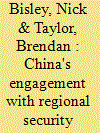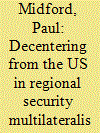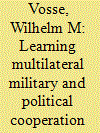| Srl | Item |
| 1 |
ID:
137620


|
|
|
|
|
| Summary/Abstract |
Using a case study of Beijing’s participation in the Shangri-La Dialogue, a prominent annual security gathering in Singapore, this article analyses China’s approach to Asian security multilateralism. It does so by developing and employing a typology consisting of four characterizations of multilateral engagement: China as “blocker”; China as “socialized participant”; China as “shaper”; and China as “opportunistic participant”. The article shows that in its approach to the Shangri-La Dialogue, China displays all four of these traits, while noting that some are more prevalent and compelling at certain points in time. It uses this finding to draw conclusions about Beijing’s future engagement with the Shangri-La Dialogue and its broader approach to security multilateralism. It also contributes to the larger debate over whether China is a “revisionist” or a “status quo” rising power.
|
|
|
|
|
|
|
|
|
|
|
|
|
|
|
|
| 2 |
ID:
159422


|
|
|
|
|
| Summary/Abstract |
This article poses the question of why, after having consistently pursued an isolationist strategy of avoiding security ties with partners other than the US, and having followed the US in opposing regional security multilateralism, did Japan suddenly reverse course and get out in front of the US with its first post-war regional security initiative. This article addresses this question by tracing the internal debates, policy process and motivations that drove Japan to reverse its position, a process that transformed Japan into the leading champion of regional security multilateralism in East Asia.
|
|
|
|
|
|
|
|
|
|
|
|
|
|
|
|
| 3 |
ID:
159424


|
|
|
|
|
| Summary/Abstract |
n January 2009, the Japanese government decided to join the multilateral-force counter-piracy operations in the Gulf of Aden and the coast of Somalia and has since then developed into one of the most active and involved forces combatting maritime piracy. This special issue defines de-centering as a ‘process of moving away from a state of centering by building relationships with other partners’ through ‘security and defense consultations and dialogues’. This article argues that this counter-piracy mission involved many if not all of these components and can be seen as an important opportunity for Japan to deepen its understanding of forces and governments of countries and forces other than the United States in various dialogue and coordination forums, joint capacity building, and joint training exercises. While it is not argued that this will in any way weaken US–Japan relations or the role of the United States as Japan's main security guarantor, it demonstrates that Japan and the Self Defense Forces can become a security partner for countries in Europe or NATO. This potentially gives Japan more options whether to support or not support specific foreign policy decisions by the United States, a condition for de-centering.
|
|
|
|
|
|
|
|
|
|
|
|
|
|
|
|